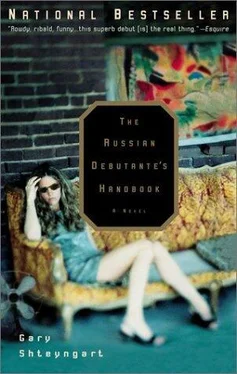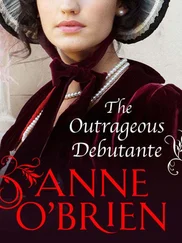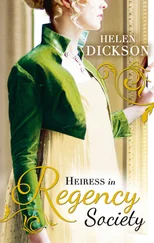Gary Shteyngart - The Russian Debutante's Handbook
Здесь есть возможность читать онлайн «Gary Shteyngart - The Russian Debutante's Handbook» весь текст электронной книги совершенно бесплатно (целиком полную версию без сокращений). В некоторых случаях можно слушать аудио, скачать через торрент в формате fb2 и присутствует краткое содержание. Город: New York, Год выпуска: 2003, ISBN: 2003, Издательство: Riverhead Books, Жанр: Современная проза, Юмористическая проза, на английском языке. Описание произведения, (предисловие) а так же отзывы посетителей доступны на портале библиотеки ЛибКат.
- Название:The Russian Debutante's Handbook
- Автор:
- Издательство:Riverhead Books
- Жанр:
- Год:2003
- Город:New York
- ISBN:0-7865-4177-6
- Рейтинг книги:4 / 5. Голосов: 1
-
Избранное:Добавить в избранное
- Отзывы:
-
Ваша оценка:
- 80
- 1
- 2
- 3
- 4
- 5
The Russian Debutante's Handbook: краткое содержание, описание и аннотация
Предлагаем к чтению аннотацию, описание, краткое содержание или предисловие (зависит от того, что написал сам автор книги «The Russian Debutante's Handbook»). Если вы не нашли необходимую информацию о книге — напишите в комментариях, мы постараемся отыскать её.
and
. The Russian Debutante’s Handbook Bursting with wit, humor, and rare insight,
is both a highly imaginative romp and a serious exploration of what it means to be an immigrant in America.
The Russian Debutante's Handbook — читать онлайн бесплатно полную книгу (весь текст) целиком
Ниже представлен текст книги, разбитый по страницам. Система сохранения места последней прочитанной страницы, позволяет с удобством читать онлайн бесплатно книгу «The Russian Debutante's Handbook», без необходимости каждый раз заново искать на чём Вы остановились. Поставьте закладку, и сможете в любой момент перейти на страницу, на которой закончили чтение.
Интервал:
Закладка:
THEY DIPPED PRETZELSinto the baked salmon salad which Laszlo’s crew had spread out over the time-worn aluminum desks left over from the moving company. “This is not very much,” Mr. Rybakov said to Vladimir. “We can go home. I have herring.”
“Oh, I’ve eaten enough of your fish,” Vladimir said.
“Shut your mouth,” Rybakov said. “All the fish in the Caspian Sea would not be tribute enough for you, young King Solomon. Do you know what it has been like for me all these years? Do you know what it is like, to be a man without a country?”
Vladimir reached far across a table for another container of salmon, determined not to show his betrayal. And, yes, he knew what it was like.
“What if there is a war?” asked Mr. Rybakov. “How will you defend your motherland if you don’t have one?”
“That’s right, you can’t,” Vladimir said.
“Look at me, for example. I’m all alone in this country, I’ve got no family, no friends to speak of. You—you’re going to Prava. The Fan—all I had was the Fan, but now I have this!” He took the certificate out of his jacket pocket. “Now, I am a citizen of the greatest country in the world, if you discount Japan. Listen, I’m not young anymore, I’ve seen just about everything a man can see, so I know how it is: you’re born, you die, there’s nothing to it. You have to belong somehow, to be a part of a unit. Otherwise, what are you? You’re nothing.”
“Nothing,” repeated Vladimir. Laszlo was pointing to a clock. The show was almost over.
“But you, Vladimir, my dear young man, in Prava you will be part of something so big, so tight, you will never again have to wonder what unit you belong to. My son will take care of you like his own. And after I finish those business dealings with Miss Harosset and these damn Kandunsky paintings, may they all go to the devil, I will come and visit you and my Tolya. How about that?”
“We will have a great time, the three of us,” Vladimir said, picturing them rowing down a river with a basket of fried chicken and a jar of herring.
“And I will walk through the streets of Prava, with my chest stuck out proudly…” He stuck out his chest. “I will walk as a big, beautiful American.”
Vladimir put his arm around Mr. Rybakov’s lumpy back and pressed the old sailor to him. His smell reminded him of his step-grandfather’s who died in America after a prolonged bout with cirrhosis of the liver, kidney stones, and, if one could trust Dr. Girshkin’s diagnosis, an imploded lung. There it was—the vodka breath; the musky aftershave; and that certain brisk industrial scent, which brought to Vladimir’s mind the image of machine oil sprinkled liberally across the gears of a rusted Soviet metal press, the kind at which Vladimir’s step-grandfather once pretended to toil. It pleased Vladimir that the Fan Man smelled the same. “And now, Comrade Rybakov,” he said, “or, as we say in this country, Mister Rybakov, you will permit me to buy you several drinks.”
“O-ho,” Rybakov said and squeezed Vladimir’s nose with his many-flavored fingers. “Well, let’s go find a bottle then!” They helped each other out into the oddly silent street where the afternoon sun bore down on the cast-iron facades and on a string of idled moving vans.
HIS LAST FEWhours in Manhattan were spent in a cab with tinted windows; Roberta had been kind enough to advance him a thousand dollars from her considerable savings, and advised him to stay mobile and not to call anyone (especially “the woman”). As for Baobab, according to Roberta, he was holed up with relatives in Howard Beach, while his uncle Tommy tried to broker a cease-fire with Jordi.
Meanwhile, Vladimir spent two hundred dollars going around the limestone curve of the Flatiron building, down Fifth Avenue past the Ruoccos’ apartment house, then through the smaller Village tributaries that lead to the Sheridan Square subway station. It was from this station that Fran would daily disembark on her way back from Columbia, and Vladimir was entertaining the odd hope of seeing her, just one more glimpse, for memory’s sake. He made fifty of these trips, all of them in vain. It was remarkable the cabby didn’t drive him straight to Bellevue.
Fifth Avenue, the first Friday of September, the heat and business of a late afternoon, the shish-kebab stands closing down for the day, women with suggestive crescents of calf departing work at furious clips, another grand evening in the making here in the documented epicenter of the precise navel of the universe, the first New York evening that would pass without Vladimir in attendance. Yes, good-bye to all that. Good-bye to Vladimir Girshkin’s America, its lofty landmarks and sour smells, good-bye to Mother and Doctor Girshkin and their tomato patch, to the several strange-duck friends that were cultivated, to the flimsy goods and meager services that gave sustenance, and, finally, to his last hope of conquering the New World, to Fran and the Ruocco Family, good-bye.
And good-bye to Grandma. To think of America, he had to start with her, the only one who had consistently tried to better his stay here, she who had chased him over the hills and dales of the Girshkins’ upstate dacha trying to force-feed him wedges of cantaloupe, deep bowls of farmer cheese… How simple life would be if it began and ended with food-for-love and an old woman’s sloppy kiss.
And what of Fran? On his final Village circuit he thought he saw her, a straw hat, a bag of peppers for the Ruoccos’ nightly feast, a leisurely wave to an acquaintance passing by. He was mistaken. It was not her. But while he was under false impressions, his instinct was to lunge out of the slow-moving cab, press his lips to one studded ear, and say… what? “Nearly raped by a drug lord. Marked for death. Gotta run.” Even in contemporary circumstances, where just about everything is possible, this was not possible. Or perhaps he could have said it in terms she would appreciate, the words of the doomed Swede boxer in the Hemingway story:
“Fran, I got in wrong.”
But after this nonencounter with Fran, he ordered the driver to the airport. There was nothing more to be done. America, it seemed, was not entirely defenseless against the likes of Vladimir Girshkin. There was a sorting mechanism at work by which the beta immigrant was discovered, branded by an invisible ß on his forehead, and eventually rounded up and put on the next plane back to some dank Amatevka. The events of the last few days were no mere coincidence, they were the natural culmination of Vladimir’s thirteen years as an unlikely Yankee Doodle, a sad mark on his Assimilation Facilitator’s record.
Well, fuck America; or, in poetic Russian parlance, na khui, na khui. He was almost glad that he didn’t see Fran, that the past, which only yesterday was the present, was over. He had failed once again, but this time he had come away all the wiser. The boundaries, the contours of victimization at the hands of Mother, Girlfriend, and this dough-bellied adopted land of his, were all too clear. He would never suffer like that again. In fact, he would never be an immigrant again, nevermore a man who couldn’t measure up to the natives. From this day forward, he was Vladimir the Expatriate, a title that signified luxury, choice, decadence, frou-frou colonialism. Or, rather, Vladimir the Re patriate, in this case signifying a homecoming, a foreknowledge, a making of amends with history. Either way…Back on that plane, Volodya! Back to the part of the world where the Girshkins were first called Girshkins!
HE DUG HISnails into his palms and watched tangible Manhattan become a cardboard skyline behind him. Soon enough he would remember precisely what he was leaving (everything; her) and have his little crying jag on the plane.
Читать дальшеИнтервал:
Закладка:
Похожие книги на «The Russian Debutante's Handbook»
Представляем Вашему вниманию похожие книги на «The Russian Debutante's Handbook» списком для выбора. Мы отобрали схожую по названию и смыслу литературу в надежде предоставить читателям больше вариантов отыскать новые, интересные, ещё непрочитанные произведения.
Обсуждение, отзывы о книге «The Russian Debutante's Handbook» и просто собственные мнения читателей. Оставьте ваши комментарии, напишите, что Вы думаете о произведении, его смысле или главных героях. Укажите что конкретно понравилось, а что нет, и почему Вы так считаете.












